It is now over four years since then Agriculture Commissioner Phil Hogan brought forward the idea for EU legislation on Unfair Trading Practices (UTPs). Since then, it has laboriously proceeded through the EU and national legislative process and is still only operating as an interim enforcement authority in Ireland.
The process of recruiting a chief executive is underway and Minister McConalogue is confident that the Office of Fairness and Transparency will be “up and running before the end of the year.”
Unfortunately, it is already playing catch up. The EU legislation which the Office will give effect to in Ireland became enforceable here from April this year, when the current interim enforcement authority (EA) came into effect.
It was supported by a substantial advertising campaign over the summer to make businesses and farmers aware of the law and its existence.
Despite this effort, there is little evidence of meaningful farmer engagement with the service.
Back in June, when the Irish Farmers Journal enquired with the Office on the level of complaints and investigations, it was revealed that at that point, six complaints had been received, of which four were outside the scope of the regulations and the other two were being screened to see if they fell within the remit of the authority.
When the Irish Farmers Journal again enquired about progress last week, the response was that they have now received eight complaints, six of which are outside the scope and two which are receiving consideration.
Fear factor effect on complaints
The authority again cited its belief that the “fear factor” is a barrier to complaints being made, and, in an attempt to reassure potential complainants, said that the EA “will use every power available to them, to ensure that any threat or act of retaliation by a buyer arising from a supplier exercising their legal right to make a complaint will result in the strongest possible sanctions against that buyer.”
This may be an honourable sentiment, but the EU and the Office for Fairness and Transparency will be judged not on sentiment but results.
To date, farmers have bypassed the EA and taken their protests to supermarket doors, firstly with pigmeat earlier in the year and more recently on egg prices. They had some success, but this was achieved through old style negotiation behind the picket lines.
Farmer-retailer relations can only become more strained in the coming months, as supermarkets look to constrain consumer price increases at a time when farmers will be facing horrendous production cost increases.
Producer groups
One area where the UTP legislation hoped to boost farmer negotiating power is though legalising the establishment of producer groups. This is an attempt to level the negotiating playing field between individual farmers and large corporations.
While there have been some tentative steps taken in this area, the reality is that farmers continue, by and large, to trade in insolation. It would be interesting if farmer producer groups were able to take a leaf from the fertiliser industry and try and negotiate a supply arrangement where their business is underwritten, either by the processing industry or Government, to protect them against market volatility.
The publicity around UTP legislation and the Office for Fairness and Transparency risks creating the impression that this is the solution to all farmer price problems.
It is not – markets across the world set the value for commodities coming off our farms. Also, the legislation is heavily weighted towards protecting suppliers further along the supply chain in dealings with supermarkets, particularly in the honouring of contracts, payment terms and requirement for contributions to promotion costs.
What the legislation and Office can do for farmers is be proactive in investigating the part of the supply chain they are most engaged with, namely factories.
It is what the Office does in this area that will demonstrate its effectiveness and value to farmers and it needs to quickly move from sound bites to action.









SHARING OPTIONS